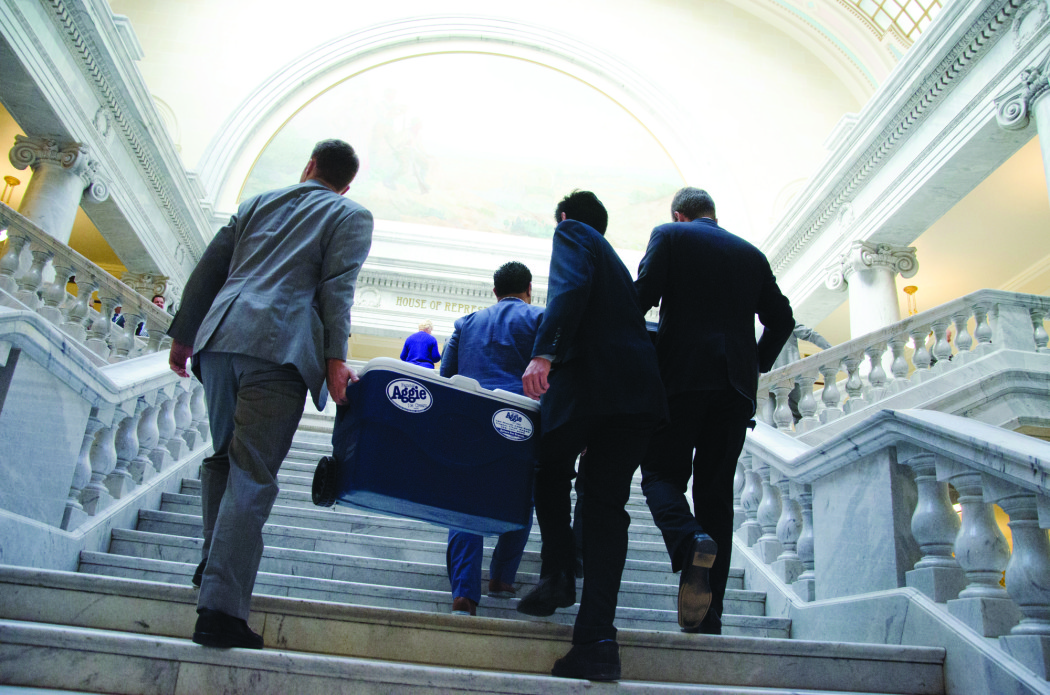Mental health, science building, grad programs of interest in legislative session
At least 14 bills could potentially affect Utah State University in the 2016 legislative session.
Between 12,000 and 15,000 bills will be introduced during the session, but the majority of them are not public yet. Once a bill has been drafted and cleared with an attorney, it can be numbered, and is then posted publicly and open for comment.
“For us, at this point… it’s difficult to really take a position, and it’s impossible to take a position on bills that we haven’t seen the language on yet,” said Neil Abercrombie, director of government relations for Utah State. “And then it’s also difficult to take a position when it’s still very general, whether or not it’s going to come together or what sides are advocating for what. We don’t have the final product yet.”
Usually 20 to 30 bills have the potential to impact higher education per session, and Abercrombie estimates it will be closer to 30 this year.
“Impact is really general. Some of those could be small tweaks that won’t really change anything. Some could be major changes that would change a lot,” Abercrombie said.
The Government Relations Council has three main objectives for the legislative session — obtain funding to address mental health issues on campus, share the university’s accomplishments to get performance-based funding, and obtain funding for a new science building.
There is a lack of mental health resources in higher education all over the state, and so universities are looking for more funding for CAPS services. It can take four weeks for students to get an appointment at USU’s counseling center, and for some students, four weeks is too long.
Barrett Anderson, the director of the GRC, said last year there were two completed suicides in his apartment complex alone.
“Honestly, it’s heartbreaking that any student who is here at a university to improve their education and themselves as a person would end up taking their own life,” Anderson said.
In addition to a one-time appropriation, Utah State is asking for two perpetual salaries for CAPS. This would help more students get the help they need in a timely manner.
Several universities in Utah were awarded funding to build new science buildings, which is why Abercrombie believes USU has a good chance at getting funding to replace the Biology and Natural Resources building.
The GRC spends a few days at the state capital during the legislative session. In addition to serving legislators Aggie Ice Cream, they are looking for performance-based funding.
“We’ll be talking about the importance of our performance as a university,” said Ashley Waddoups, student advocate vice president. “A lot of what our job is to make a good face and having some really good talking points and stats about what we’ve accomplished.”
Sen. Stephen Urquhart (R) is the chair of the Higher Education Appropriations Committee, and has been a proponent of USU’s interests since 2001. This will be his last legislative session in office, but Abercrombie said he will not be a lame duck.
Urquhart met with the GRC in fall semester and discussed bills he would like to get passed. The bill that Anderson said he was most excited about would appropriate $6 million to graduate programs at Utah State and the University of Utah.
“This bill will be an excellent way to strengthen higher education in the state of Utah and help our graduate programs accept higher amounts of students who wish to obtain a master’s or doctorate,” Anderson said. “Stronger graduate programs will help the state of Utah to educate more professionals and strengthen the state’s economy.”
Legislative analysts are concerned that the growth the economy is experiencing right now won’t continue, and so they will be conservative when it comes to increasing ongoing funding. USU has $180 million in one-time funding and $380 million in ongoing funding.
“They wanted to be a little bit more conservative and save a little bit. The legislature has decided to take $50 million of that and not spend it on ongoing items.”
The legislature will be more likely to fund short-term investments so if the economy slows down, they won’t have to cut higher education budgets.
Other topics of interest to the Utah System of Higher Education include:
- Guns on campus
- Freedom of speech
- Math/College readiness
- Concurrent enrollment
- STEM Action Center
- Funding higher education buildings
- Military/in-state tuition
The legislative session begins on Monday and will end on Thursday, March 10.
— brennakelly818@gmail.com

